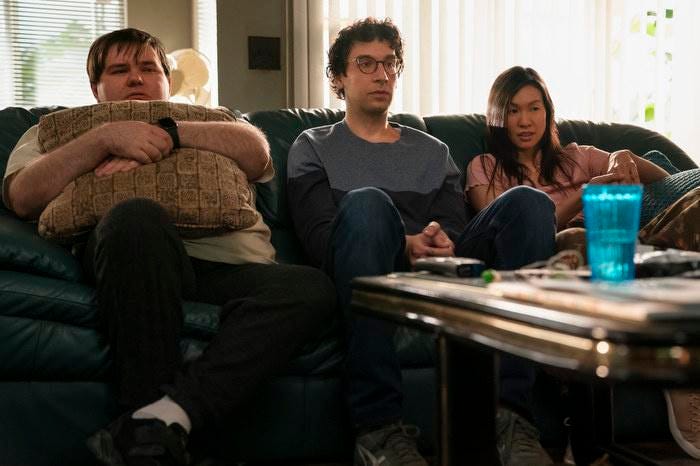
From left to right Albert Rutecki, Rick Glassman, and Sue Ann Pien star in ‘As We See It’
Amazon’s newest comedy-drama series, As We See It, takes representation seriously. The show follows three autistic roommates as they navigate jobs, love, friendship, and life with neurodiversity. The actors who play the autistic lead roles of the show all identify as living on the autism spectrum as well.
As We See It debuts January 21 with all eight episodes of the first season on Prime Video in more than 240 countries and territories worldwide.
The show, from creator Jason Katims, stars Rick Glassman, Albert Rutecki and Sue Ann Pien as the roommates. The series also stars Sosie Bacon as their aide, Chris Pang as Pien’s brother, and Joe Mantegna as Glassman’s father and was based on the Israeli show On the Spectrum.
One of the largest differences between the Israeli version and the upcoming American show is the use of neurodiverse actors. “In our show, all the neurodiverse characters are played by neurodiverse actors. We actually also have a couple of neurotypical roles that are played by actors who identify as being on the spectrum,” Katims explains. “It’s important to me because I wanted to get it as right as we could. As authentic as we possibly could… It was also really important, for the same reason, to have people on both sides of the camera who identify as on the spectrum. We had people in the writer’s room, the editing room, on set and in the production office, as well. They brought so much to the show.”
The care that Katims had in having neurodiversity represented on set helped the production of the show innumerably, especially when it came to supporting the actors. “There were so many [neurodiverse] actors and people who had family members who were on the spectrum… There was an intuitive sense of how to behave around somebody who may have sensory issues or sensitivities or just how to speak in a way so somebody on the spectrum could follow and not take things personally,” Pien says. “It was like there were a lot less landmines on set, so to speak.”
Recommended For You
While every actor came with their own experiences with neurodiversity, the production supported them. Glassman was diagnosed as an adult. He recalls, “All of these seemingly unrelated obstacles became patterns that made sense… It’s something that I was and am proud of.” His relationship with autism differs from his character’s who is less upfront with his diagnosis. However, being able to play a character with autism was exciting for Glassman. “It is super exciting to be working on a show where I’m playing a character that has traits that I relate to, that I used to be ashamed of or not want but now I get to use as a tool to connect to a craft.”
Playing a neurodiverse character was also freeing for Pien. “I have to usually hide all of my differences. I wrote this piece about how I’m playing a character on top of a character when I go into audition.” She explains. “I have to first build a foundation just be normal… So on the set, I didn’t have to do any of that. I was unhampered. It really was an environment that I got to be the best actress I could possibly be because there was no sense of fear.”
Pang, who plays Pien’s brother on the show, entered the production with some fear of his own. “I haven’t been around autism much in my life. I haven’t been exposed much to it, so I was kind of scared, to be honest,” he recalls. “I think a lesson that I learned filming the show, which I hope when people watch the show [will learn as well], is that you can become more familiar with what it means to be autistic and not be fearful of it as I was.”
The show’s cast has great chemistry both on and off-screen, something that also sells the authenticity of the show. “We formed great connections, not only with each other but with the crew, which is one of the most important things to me,” Bacon says of the production. “One of my favorite parts about working is getting intimately close with a group of people.”
“The entire cast was so good. I really like working with them and we had like a really good dynamic right away,” Rutecki adds.
Getting the show right was important to Katims as he has an autistic son and didn’t see a lot of media that featured neurodiverse adults. He was already thinking about creating a show that related to autistic adults when his agent sent him the first three episodes of On the Spectrum, as they only had three translated at the time. “I just watched these three episodes immediately, as soon as they were sent to me, in a row. And thought ‘okay, this is the show I want to make, this is the story I want to tell,’” he recalls.
Similar to Katims, Mantegna also has an autistic daughter. “I can honestly say our life is the same combination of things as portrayed on this show,” he explains. “There’s just as much humor as there are those un-humorous moments… It’s a correct and honest portrayal of what that situation is like. And if nothing else, I could at least relate to it on a very personal level. It’s not like I could say to myself, ‘Gee, I wonder if this is true to form?’ because it is.”
As We See It debuts January 21 on Amazon Prime.




